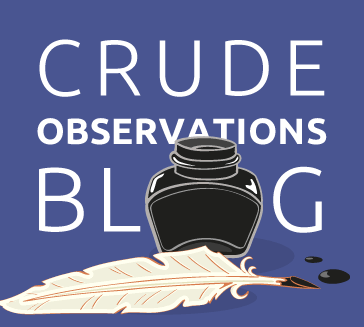I don’t know about you guys, but I find the energy sector to be a really complicated industry. It’s multi-faceted and there are so many aspects to it. There is an up/mid/downstream, there’s exploration, production, transportation and retail. There are multiple products, raw and refined, petrochemicals, onshore, offshore, conventional and unconventional, shale, sands, rules, regulations, environmental considerations, consultations, land claims, farm-ins, joint ventures, cartels, multinationals, IOC, seven sisters, seven dwarves… It’s never-ending and enough to make your head spin.
And then there’s the terminology – rathole, annulus, toolpush, birdbath, mud, dog collar, cat walk, dog house, monkey board, pigging, bell hole – what’s with all the animal references?
What’s the point of this? Well bear with me, as it was that just the other day, while I watched one of my genius blog ideas get usurped (yes, I said usurped!) by a much more talented scribe, I came up with the idea that as a public service I should define, as best as I could, the key terminology that everyone should know when discussing the energy industry today, whether on Twitter in the form of mini-rants, other social media or face to face with angry protestors or your mom. Not the stuff above mind you, the more qualitative stuff…
So presented to you, in glorious “alphabetical” order, are 26 key energy and energy related terms that Canadians need to know, right now.
America: As in the United States of. America is the beast next door. America is Canada’s best and worst customer. Best because they hoover up pretty much every spare carbon molecule we have the audacity to produce. Worst because they seem to have tacitly gotten a semi-permanent discount on price. We make a big show about wanting to diversify our market, but let’s face it, if we weren’t next to “America”, our oil industry would be a pale imitation of the beast we have now.
Bitumen: Ah bitumen. This, of course, is our pot of gold at the end of the rainbow. 178 billion barrels of the hardest, stickiest, goopiest frozen black peanut butter you can find. If only we could figure out what it is, how to get it out of the ground, how to process it and get it to flow through pipelines to ready markets in America. Then we’d have something. A store of oil wealth that would be the envy of the entire world! What? We know, we did and we are? Who knew? Not like anyone acts like it. Or we’d have more pipelines. Which leads me to…
Crude by Rail: A wise man once said in a presentation that the crude will always find its way to market. If the easiest way is blocked it will go the next way and the next and the next. Why? Because it is needed. So if pipelines don’t happen, you just get an alternative form of pipeline such as the soon to be 500,000 barrels per day of black tanker cars in miles long trains happily snaking their way back and forth across the continent. Sure it’s more expensive, environmentally disastrous and an inner city or remote mountain pass disaster waiting to happen, but at least we don’t have to worry about pipelines. Phew!
Donald Trump: The sometime leader of the free world, the Donald is the bane of our existence and erstwhile saviour of the oil patch with his approval of Keystone XL, another of those fiendish pipelines we hear so much about. Distractions aside, the mercurial cheeto in chief has reduced both taxes and regulations in his country’s energy sector and has been given the opportunity to preside over an unprecedented wealth creating energy boom. Like him or not, our leaders could learn a lesson on that front and should be so lucky.
Ethical Oil: This is a term that many people ascribe to Canadian produced oil. I’m here to tell you that the term is a bunch of horse hockey. It’s meaningless. Look, I get it. We’re not Saudi Arabia or Russia or Nigeria or any of these human rights abusing non first world countries that produce a lot of oil. But ethical? How can a carbon molecule be ethical? It’s dumb. Subject to the most stringent regulatory and environmental standards? Yup. Respect for rule of law and equal opportunity? Yup. Well paid jobs and good corporate citizens whose taxes support a broad range of social safety nets and public goods? Sure. But spare me the ethical – all the rest of it is reason enough to buy our oil, don’t preach. It’s icky.
Fracking: The process by which eager-beaver oil companies drill wells 5,000 feet down and then 10,000 or more horizontally and then pump thousands of gallons of water and tons of very fine sand into the well under super high pressure causing cracks in the rock that get propped open by the sand allowing precious carbon molecules to come rushing to the surface. While fracking has been around since some of the earliest wells ever drilled (using bombs), the technological innovation of fracturing the rock so precisely and after such an exacting horizontal drill is the true innovation of the tight oil movement. Remember, no matter how much I make fun of it and question its sustainability, this has been a total game-changer in North America.
Greenhouse Gases: Ah yes, those pesky things. They are bad. Yes indeed. And they contribute to global warming. So we should be managing them, reducing them, regulating them. And we do. We have one of the strongest regulatory regimes in the world when it comes to emissions, flaring, fugitive methane emissions, you name it. We also have a carbon tax and an emissions cap. We are tightening the rules, voluntarily. We have industry funded research facilities working around the clock to reduce the emissions intensity of the oilsands such that our “dirty” oil is close to the American average. We have carbon capture facilities, we’re retiring coal plants! Look, greenhouse gases are a part of life. We can’t shut down the energy sector without shutting down the economy and we are doing our part. At some point someone will notice. Right?
Heavy Oil: This is what the vast majority of Canadian oil is. And is what the vast majority of what American produced light (see?) tight oil isn’t. Why is this important? A number of reasons. First, heavy oil can produce a lot of different products, light oil is pretty much gasoline. So the demand for heavy oil is as robust if not more than for light oil and the refineries that want this heavier oil also happen to be located where our best (and only) customer is. The problem? Heavy oil doesn’t sell for as much as light oil because it costs more to refine, notwithstanding all the nifty refined products you get out of it. Another problem? These refineries are far away. So it costs more to ship the heavy oil there. Another problem? Demand has grown pretty quickly for the energy sector and the infrastructure hasn’t kept up, so it’s hard to meet the demand sometimes. The result? We get lower prices for our technically lower quality, in demand heavy oil. This is called the differential (ie. The difference in price between a product we don’t produce and the one we actually do). However, new pipelines will help reduce this differential.
Indigenous Consultation: Not to be confused with NEB processes, a lot of people are confused about what this means and so am I. But I feel it’s worth taking a crack at it. I’ve found the easiest way to look at it is that a bunch of years ago we (evil Europeans) entered into “treaties” with “First Nations” (the people who were here first) wherein we ceded territory to them in certain traditional areas where we figured we’d never want to be. Then we said that if we were ever going to come up and do something, we’d ask first. Then of course oil and gas and minerals were discovered in all these remote locations and we wanted to exploit those resources and ship them to where they were wanted. Except we had that pesky promise that we would, you know, ask the neighbours if it was OK to run an irrigation system under their newly sodded lawn (metaphorically speaking). This was deemed such a fundamental thing that here in Canada, we actually put that neighbourly concept into our Charter of Rights. Only problem is that we suck at it and don’t like it when the plans are challenged. But we’re getting better, so there is hope. I understand that the third time is the charm.
Kenney: Widely expected to be the next King of Alberta (wait, that’s not a thing?), Mr. Kenney is the leader of the Opposition in Alberta and, with an election coming next May, it is reasonable to expect to see Mr. Kenney run concurrent campaigns against the Rachel Notley NDP and the Justin Trudeau Federal Liberals. The two-pronged campaign makes sense in Alberta where anti-Liberal and anti-Trudeau bias is quite powerful and many in the business community acknowledge (mostly in secret) that Notley hasn’t done that bad a job. If a pipeline isn’t back in business by the election, the Notley NDP will be overwhelmed by the Kenney led UCP. If it is, she has a fighting chance. Trudeau has no desire to deal with Kenney in Alberta and Ford in Ontario at the same time. This is why I have hope for TransMountain going forward and think Kenney’s road to power may be a little bumpier than many think.
LNG: Canada’s lifeline to energy infrastructure and a gateway to exploiting yet another part of Canada’s abundance of resources. The LNG market in Asia is dynamic and growing. China is applying tariffs on US LNG shipments in retaliation to US tariffs on everything (trade wars are easy!). The tailwinds for kick-starting the Canadian LNG industry could scarcely be stronger. All we need is a little fiscal kick in the pants from the federal government and we could see LNG Canada’s positive FID as early as the end of October. Look, we can have nice things, sometimes we may need to pay for them. Am I in favour of a tax break to LNG Canada to get going? Yup. Git ‘er done fellas.
Media: These are the people who work tirelessly to get unexplained information out to the great unwashed as quickly and breathlessly as possible in order to secure clicks, eyeballs and relevance. While they often get things wrong, the sheer volume of media – social or otherwise – means that pretty much all information is out there and for those patient enough, it can be put together to develop “views” and “opinions” based on verifiable “facts”. Consider the following recent discrete bits of reporting I have read. Spending in the Permian continues at record pace. The US is the number one producer of oil in the world. Soo to be energy independence. Lack of pipeline capacity in the Permian. Service costs are rising. Permian oil sells at a discount. Wells drilled outnumber completions. Decline rates are higher than expected. Conclusion: Unless the US solves the capacity issues in the Permian, its dominance of the oil industry and path to energy independence via high cost rapidly declining production could end up being short-lived. See how easy that was?
Nasca Lines: A series of lines drawn into the ground in the high desert in southern Peru. I know, not energy related (or, are they?). I just think they are cool.
Natural Gas: Oil’s much more flammable stepsister, natural gas gets none of the love or hype that oil does. This despite its utility as a fuel for electricity, feedstock for petrochemicals and usefulness for, I don’t know, heating stuff while producing less emissions. Really, when you think of it, this abundance of natural gas could help reduce the reliance on coal right? And maybe reduce emissions by like 17% in a place like the United States. Wait, it already has? Well, who knew. Someone tell Greenpeace, they’ll be overjoyed we found a way to reduce emissions!
OPEC and OPEC +: Otherwise known as “those who do Saudi Arabia’s bidding”. OPEC and OPEC + are a collection of oil producing countries (most of their oil being unethical – see how stupid that sounds?) who represent close to 45% of global oil production. Once a highly relevant cartel and now still a mostly relevant cartel with assorted hangers on, OPEC etc. sets the baseline production for the world. Possessed of the world’s only easily deployed spare capacity, OPEC (Saudi Arabia) serves as a brake and an accelerator for world oil prices and the industry as a whole.
Permian: The epicentre. The blackhole of the energy sector. The gravitational pull of this once in secular decline conventional field is pretty much the one and only reason why the US is having a boom and we aren’t. Billions of barrels of light tight oil in stacked formations in easy to access West Texas that can be drilled 365 days a year (OK 363, Super Bowl and Thanksgiving are holidays) and accessed via horizontal wells up to 5 miles in length and then fractured using tons of sand and water pumped underground under extreme pressure. The Permian is a glorious and frightening testament to ingenuity and capitalism. That the oil is hard to get, the production per well relatively low and break-evens not really competitive with alternative conventional sources doesn’t matter. It’s there and it’s coming out. And no need to call it ethical. It’s not. It’s oil. Money in, oil out. Lather, rinse, repeat. Want to know why there is no capital coming to Canada? Start with the Permian. Oh, and the next point.
Quantitative Easing: So what if someone threw a Permian party and no one came? Or, put another way, what if someone threw a Permian party and they couldn’t afford to pay for it? Well fortunately, in the United States post 2009, there was this thing called the Great Recession that led to record low interest rates and Quantitative Easing where the Fed basically flooded the market with paper, driving yields into the ground. Investors and lenders alike found themselves desperately searching for yield and, lo and behold, the oil patch was more than happy to separate them from their money. I mean seriously, who wouldn’t, right? What followed was a debt binge of epic proportion which fuelled the ascendancy of – you guessed it – the Permian. Even when Quantitative Easing came off, the low rates persisted and the capital flowed. However, it’s tighter. Rates are rising and the easing is being reversed. The vodka is no longer flowing into the punch bowl so it is expected that the party may become somewhat more subdued.
Recession: A pesky economic situation that arises every seven to ten years where the party comes to an abrupt end, people lose jobs and life just generally sucks. Generally in an environment where prices are rising (inflation) and wage growth isn’t keeping up and energy prices are rising and interest rates are rising (to control inflation), borrowing is or has been accelerating and assets are perceived to be, what’s the word, over-valued, something has to give. Usually it’s the asset values first which leads to declines in wealth and industry and the general economic environment. We call this a recession. And one is overdue. It’s coming.
Social Licence: This is a license that is issued by the government that allows you to build whatever infrastructure you feel like. No, I’m lying. This is another of those terms that, like Ethical Oil, really means nothing. Originally developed by the mining industry to mean buy-in and acceptance from local groups to development, social licence is only slightly less annoying than that other term. One can only assume that “social licence” is a by-product of “meaningful consultation and accommodation” and that it is facilitated by the production of an ethical product. Or it’s a hog-wash term now used exclusively by politicians to make it seem like they care about whether everyone affected directly or tangentially by a project is not overly triggered by it. Reality is that social licence doesn’t exist and can’t be created. Exercise of rule of law and due process, presentation of benefits and, where that doesn’t work, bribing people with their own money. That’s how you get social licence. Which is an interesting segue into…
TransMountain Expansion: The root of all evil in the country. The battleground of the environment and economic expansion, right vs left. A conduit from Mordor to the Red hordes of communist China. Capitalism and greed run amok. Ground zero for the burning of the earth and a 36 inch, 1100 kilometer pipeline to climate Armageddon. A government boondoggle and the veritable end of civilization and whales as we know it! Or, alternative definition, a pipeline expansion project that will get oil out of railcars, create thousands of jobs, generate billions in taxes and allow Canada to conceivably sell oil to more than one customer.
Uninvestable: This is what Canada is if we can’t get TransMoutain right. There, I said it. I love my country and I know we can do great things. But I will be much more confident when we set about doing this one thing. The amount of capital sitting on the sidelines of the Canadian oil patch is unconscionable. I can only hope that our fearless leaders are listening.
Venezuela: Everyone’s favourite failed state. Founding member of OPEC and soon to be producing at levels less than 1/3 of its peak, notwithstanding it owning the largest proved reserves in the world. The fate of Venezuela is going to hang on the global oil industry for decades. Whither goes Venezuela, in the opposite direction goes Canada. It is poor sport to celebrate the decline of a country, but as a competing product for US refinery space, Canadian producers of heavy oil and, by extension Canadians, will benefit by this decline.
Water: Water is the underreported dirty secret of the energy sector. The use of fresh water for drilling and fracking, the management of produced water and the injecting of it into disposal wells that may or may not cause earthquakes. The water that comes out of a well, mixed with the oil and the relative proportions of each. Massive drilling activity in a parched and dry area like the Permian using fresh water that could be used for agriculture. Potential contamination of water. The cleaning of water. The separating of toxic chemicals from water. What to do if there is a spill in water, be it ocean, river or aquifer. Water is a defining issue for the oil patch globally. Do we have an oil industry with a water problem or a water industry with a water problem? Depends who you ask, but it’s critical.
XL: As in Keystone XL. Another massively controversial, end of the world as we know it pipeline. Proposed, approved and denied under Obama, resurrected under Trump and currently embroiled in several regulatory boondoggles, the Keystone XL is the third leg of the four-legged stool to get Canadian product to market. The first is TransMountain, the second is Line 3 (underway, people have moved on) and the third is Crude by Rail. Keystone XL is designed to move close to 800,000 barrels of oil per day to markets where it is wanted. Presumably that means better pricing. We can only hope.
Yes: The only acceptable answer to the question: Will the TransMountain Expansion be built?
Zero: The amount of new investment dollars we should expect to come into Canada if it doesn’t.
Prices as at September 21st, 2018 (Sept. 14, 2018)
- The price of oil rose during the week on supply fears and Iran
- Storage posted a decrease
- Production was flat
- The rig count in the US was up flat
- After a smaller than expected injection, natural gas did nothing during the week…
- WTI Crude: $70.71 ($68.99)
- Nymex Gas: $2.981 ($2.892)
- US/Canadian Dollar: $0.775 ($ 0.7615)
Highlights
- As at September 14, 2018, US crude oil supplies were at 394.1 million barrels, a decrease of 2.1 million barrels from the previous week and 78.7 million barrels below last year.
- The number of days oil supply in storage was 22.4 behind last year’s 30.8
- Production was up for the week at 11.000 million barrels per day. Production last year at the same time was 9.510 million barrels per day. The change in production this week came from increased production both in Alaska and in the Lower 48.
- Imports rose from 7.591 million barrels a day to 8.024 million barrels compared to 7.368 million barrels per day last year.
- Exports from the US rose to 2.367 million barrels a day from 1.828 million barrels per day last week and 0.928 a year ago
- Canadian exports to the US were 3.496 million barrels a day, up from 3.131
- Refinery inputs were down during the during the week at 17.415 million barrels a day
- As at September 14, 2018, US natural gas in storage was 2.722 billion cubic feet (Bcf), which is 18% lower than the 5-year average and about 20% less than last year’s level, following an implied net injection of 86 Bcf during the report week
- Overall U.S. natural gas consumption increased by 5% during the report week
- Production for the week was flat. Imports from Canada increased 11% from the week before. Exports to Mexico were unchanged from the week before.
- LNG exports totalled 17.8 Bcf.
- As of September 21 the Canadian rig count was 306 (AB – 217; BC – 24; SK – 60; MB – 5; Other – 0. Rig count for the same period last year was 358.
- US Onshore Oil rig count at September 14, 2018 was at 866, down 1 from the week prior.
- Peak rig count was October 10, 2014 at 1,609
- Natural gas rigs drilling in the United States was flat at 186.
- Peak rig count before the downturn was November 11, 2014 at 356 (note the actual peak gas rig count was 1,606 on August 29, 2008)
- Offshore rig count was flat at 18.
- Offshore rig count at January 1, 2015 was 55
US split of Oil vs Gas rigs is 80%/20%, in Canada the split is 62%/38%
Drill Bits
- 22 weeks to glory! The Federal government announced that it had referred the TransMountain approval back to the NEB, giving them 22 weeks to review the marine traffic question, killer whales and the same. The report should be back by the end of February, allowing the Feds plenty of time to approve the project (depending on the recommendation) in advance of the Alberta provincial election. Rachel Notley is pleased. At the same time, the Feds are looking to hire a retired judge to help them navigate the consultation process. While no announcement has been made about this, you would have to be a whole lot of dumb if you thought this timeline would be any different than 22 weeks.
- Trump Watch: Anyone got a judge?









